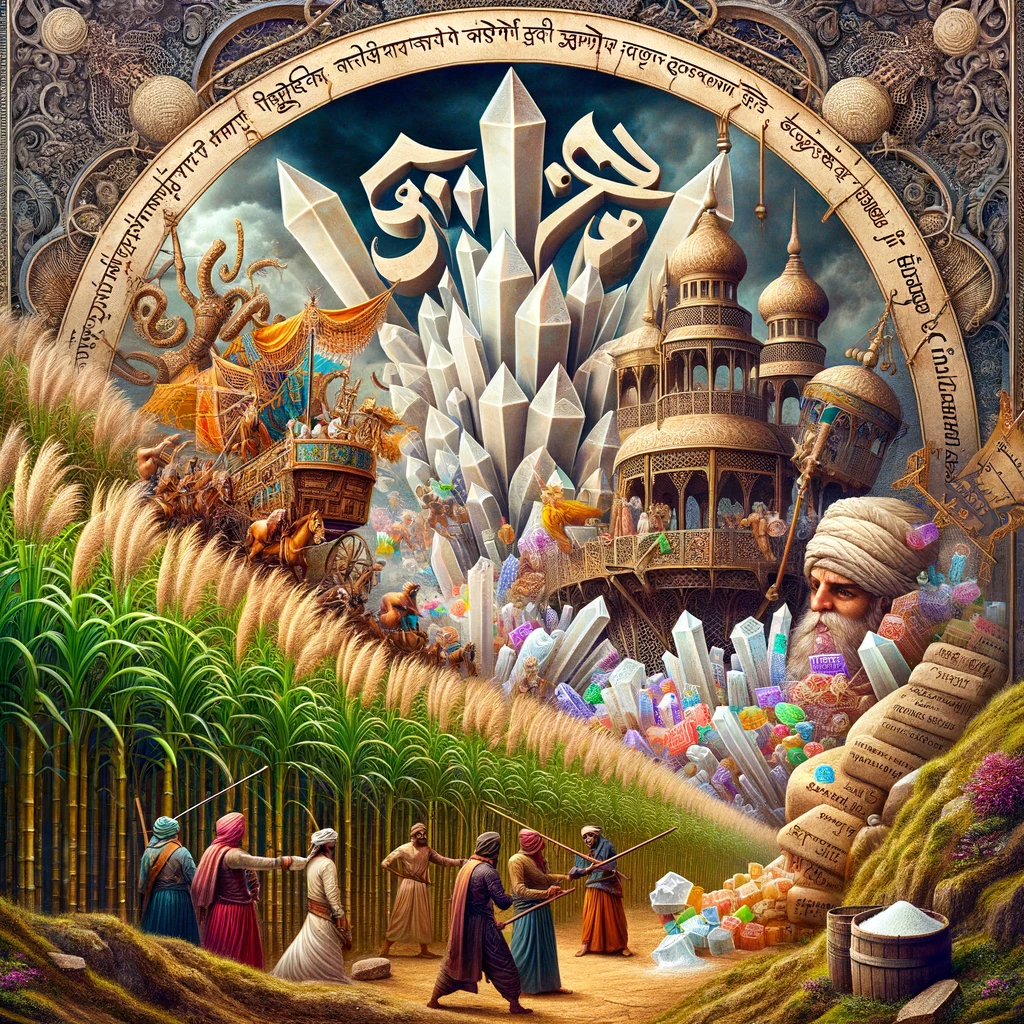Ah, sugar. That sweet, crystalline substance that has been both adored and admonished through the ages. It’s a staple in pantries worldwide, a must-have for any dessert worth its weight in sweetness, and, quite possibly, the reason why dentists everywhere are both feared and treasured. But have you ever stopped to ponder the journey of the word “sugar” itself, from its humble beginnings to the global ubiquity it enjoys today? Buckle up, sweet aficionados — we’re embarking on a whirlwind linguistic adventure that spans continents, cultures, and centuries, and enough sweet trivia to satisfy your inner candy historian.
The story begins, as many delicious things do, in India. Here, millennia ago, folks were cultivating sugarcane and boiling it down into a gritty, gravel-like substance. The first known word for it was “Sharkara” and it is recorded in Sanskrit, which translates to – wait for it – “gritty.” Not exactly the most evocative term for something that would eventually become synonymous with pure sweetness. But hey, you gotta start somewhere, right? So India, an ancient land known for its profound contributions to civilisation, including yoga and chess among other great inventions was cultivating sugarcane long before it became a global commodity.
From Sharkara to Shakkar: The Persian Connection
The Persian traders being the globe-trotting merchants of yore, who encountered this sweet marvel and called it “Shakkar.” These savvy traders introduced the sweet delight to the Arab world, where it was embraced with open arms and called “Sukkar” or “Asukar.” The sweet saga didn’t stop there; the Arabs were instrumental in spreading the crystalline joy across the Mediterranean, transforming “Sukkar” into “Saccarum” in Latin, “Azucar” in Spanish, and eventually “Sucre” in French. The English language, ever the linguistic magpie, plucked “sucre” from French, anglicised the pronunciation, and voila—sugar was born.
Meanwhile, back in India, “Sharkara” was busy spawning a plethora of sweet offspring across various regional languages, from “Sakhar” in Marathi to “Sakkarai” in Tamil. But wait, there’s more! India, not content with just one sweet invention, also produced crystalline sharkara, dubbed “Khanda” in Sanskrit. This innovation traveled west, morphing into “Qand” in Persian, laying the etymological foundation for delightful terms like “Gulkand” (rose petal jam, for the uninitiated) and “Kalakand” a dense (milk-based sweet).
Here’s where things get even more interesting. The Arabic “Qandi,” meaning something akin to crystalline sharkara, eventually sweet-talked its way into English as “candy.” So, every time you unwrap a piece of candy, you’re essentially partaking in a centuries-old tradition of indulgence. How’s that for a sweet connection?
Now, let’s take a detour to another corner of the world – Egypt. The Egyptians, with their legendary craftsmanship, took a keen interest in sarkarai refining. Their rock sugar was so prized that they started exporting it back to India. But here’s the twist: the Arabic word for Egypt was “Misr.” So, this rock sharkara from Egypt became known as “Misri” in India. See, language is a fun game, isn’t it?
Chini: The Chinese Connection
Meanwhile, on the other side of the world, the Chinese were getting in on the sugar action too. By the 7th century, they’d mastered the art of refining sharkara, and guess what happened? They produced a dazzling white sugar, a far cry from the gritty “Sharkara” of India’s early days.
But the tale of sharkara’s linguistic journey doesn’t end with saccharine treats. Ever wondered why sarkarai is sometimes called “Chini” in India? No, it’s not because sharkara is inherently cheeky or chin-chin cheerful. The term traces back to the 18th century when a Chinese settler, Tong Achew, established the first sharkara mill near modern-day Kolkata. The refined, white crystallines produced there bore a striking resemblance to Chinese porcelain—fine, white, and delicate—earning it the nickname “Chini,” a nod to its aesthetic and geographical origins.
Morus: The Mauritian Import
In a quirky twist, some parts of Gujarat refer to sharkara as “Morus,” a nod to the Mauritian sharkara that once flowed into the port of Surat. It seems the Gujaratis, with their penchant for unique pronunciations, decided that sharkara imported from Mauritius deserved its own special moniker.
France Joins the Sugar Rush: From Latin to Lollipops
The French, with their undeniable penchant for all things delectable, couldn’t resist the allure of “Saccharum.” They borrowed the word and gave it a Gallic twist, transforming it into the delightful “sucre.” This, in turn, became the inspiration for the English word “sugar,” a term that now rolls off our tongues as easily as candy does down our throats.
So there you have it—a whirlwind tour of the word from “Sharkara” to “Candy,” and everything in between. This sweet linguistic journey showcases the power of language to evolve and adapt, much like the culinary traditions that sarkarai has sweetened over the millennia. Whether it’s the gritty “Sharkara” of ancient India or the refined “Chini” of the 18th century, sarkarai’s story is a testament to human innovation, cultural exchange, and our collective sweet tooth.
In our next gastronomic adventure, we’ll unravel the origins of other culinary terms, because, let’s face it, food and language are the spices of life. So, keep your teaspoons ready and your dictionaries open. Who knows where our next linguistic feast will take us? Stay tuned, and remember life is sweet, but its stories are even sweeter.
References
- A Comparative Study of the Word Sharkara and of Its Equivalents in Hindustani as Traceable to Chinese” by Ghulam Yazdani: This scholarly article published in the PubMed database explores its etymology with a focus on potential Chinese influences. (https://pubmed.ncbi.nlm.nih.gov/2094065/)
- Online Etymology Dictionary: This website is a great resource for tracing the origins of words in the English language. You can find entries for “sharkara”, “candy,” and many other terms mentioned in the story. https://www.etymonline.com/
- Wikipedia Articles: Wikipedia offers informative articles on the history of candy and the etymology of various words. Here are some relevant entries:
- https://en.wikipedia.org/wiki/Sugarcane
- Etymology: https://en.wikipedia.org/wiki/Sugar
- Candy: https://en.wikipedia.org/wiki/Candy




